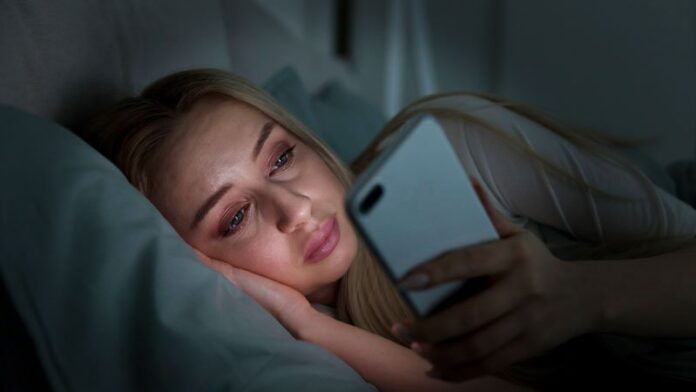[ad_1]
Smartphone “addiction” may explain poor sleep quality in a significant proportion of young adults, new research suggests.
Investigators found that almost 40% of adults aged 18 to 30 years who self-reported excessive smartphone use also reported poor sleep.
“Our study provides further support to the growing body evidence that smartphone addiction has a deleterious impact on sleep,” write the researchers.
The study was published online March 2 in Frontiers of Psychiatry.
Table of Contents
Not a Clinical Diagnosis
Smartphone addiction is not formally recognized as a clinical diagnosis, but it’s an “active” area of research, the researchers, led by Ben Carter, PhD, note in their report.
In a cross-sectional survey, 1043 college students (aged 18 to 30 years, 73% women) completed the 10-question validated Smartphone Addiction Scale Short Version (SAS-SV) and the adapted Pittsburgh Sleep Quality Score Index.
On the SAS-SV, 406 students (38.9%) reported “addiction” to their smartphones. This estimated prevalence is consistent with other reported studies in young adult populations globally, which is in the range of 30% to 45%, the researchers note.
Overall, 61.6% of participants surveyed reported poor sleep; among those who reported smartphone addiction, 68.7% had poor sleep quality, vs 57.1% of those who did not report smartphone addiction.
In multivariable analysis that adjusted for a variety of relevant factors, among those for whom there was evidence of smartphone addiction, the odds of poor sleep was increased by 41% (adjusted odds ratio [aOR] = 1.41; 95% CI, 1.06 – 1.87, P = .018).
The findings also suggest that a greater amount of time spent using the phone and greater use late at night can raise the risk for smartphone addiction.
“Should smartphone addiction become firmly established as a focus of clinical concern, those using their phones after midnight or using their phones for four or more hours per day are likely to be at high risk, and should guide administration of the SAS-SV,” the researchers write.
Caveats, Cautions, and Concerns
Reached for comment, Paul Weigle, MD, psychiatrist with Hartford HealthCare and Hartford Hospital, Hartford, Connecticut, and member of the American Academy of Child and Adolescent Psychiatry, said the finding of a relationship between addictive smartphone usage and poor sleep quality is not surprising.
“Great increases in adolescent screen media habits in recent decades have seen a concurrent increase in rates of insomnia among this population,” he told Medscape Medical News.
Weigle also noted that young people who use the phone excessively often do so in bed, “which decreases sleep onset by disrupting conditioning (the tendency for our bodies to relate bed with sleep) and by increasing physiological arousal, which makes it more difficult to fall asleep. The blue light from smartphones used at night disrupts our body’s natural circadian rhythms, confusing our brains regarding whether it is night or day, and further worsens sleep.”
Weigle told Medscape Medical News that some of his patients come to him seeking sleeping medications, although the best treatment is to perform a “smartphone-ectomy” every evening.
Teenage patients will “beg, borrow, or steal” in order to be allowed to keep their phone by the bed with the promise not to use it overnight. Three quarters of the time, when the parents are able to charge the phone in another room, “the sleep problem resolves,” Weigle said.
One caveat, he said, is that it’s “somewhat unclear whether this is best classified as an addiction or simply a seriously problematic habit. Either way, this type of habit causes a great deal of distress and dysfunction in the lives of those it affects, so it is important to understand,” he said.
In a statement, Bob Patton, PhD, lecturer in clinical psychology, University of Surrey, Guildford, United Kingdom, noted that this is a cross-sectional study “and as such cannot lead to any firm conclusions about phone usage as the cause of reduced sleep quality.
“It does, however, provide some compelling evidence,” Patton said, “that the nature of smartphone usage and its related consequences are important considerations in addressing the emerging phenomenon of ‘smartphone addiction.’ “
Also weighing in, Andrew Przybylski, PhD, director of research, Oxford Internet Institute, University of Oxford, United Kingdom, said study is “the latest, among many dozens of others, to study so-called ‘smartphone addiction,’ a condition which is not recognized by any global health body and is not a psychiatric disorder.
“The study is a correlational analysis of a sample of participants recruited on university campuses and therefore only reflects the experiences of those who had the purpose of the study explained to them. It can say nothing about behaviors in the general population,” Przybylski said in a statement.
“Readers should be cautious of making any firm conclusions about the impact of smartphone use in the general population, or the idea that they’re addictive in any objective sense, on the basis of this work,” he added.
The study had no specific funding. Carter, Weigle, Patton, and Przybylski have disclosed no relevant financial relationships.
Front Psychiatry. Published online March 2, 2021. Full text
For more Medscape Psychiatry news, join us on Facebook and Twitter.
[ad_2]
Source link












